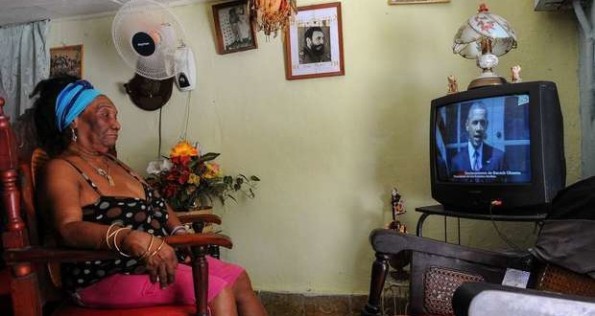Ivan Garcia, 10 October 2015 — Dressed in black, a young and elegant female officer from the Consular Section of the U.S. Embassy in Cuba, who didn’t want to be identified, met on October 2 with ten Cuban journalists, official and independent, to chat about the new Program of Diversity Visas for 2017.
Beginning October 1 until November 3, an open lottery will remain in effect, administered by the Department of State, which will offer permanent residence to those people who fulfill the strict requirements for qualifying.
The requirements to participate are simple: be a native of one of the eligible countries — among which Cuba is now included — and have an approved baccalaureate or a minimum of two years of work experience.
The candidates in the program are chosen randomly by computer. Registration for the 2017 Diversity Lottery is carried out only through the Electronic Diversity Visa Lottery.
Although the elegant woman didn’t know the recent statistics of Cubans who arrived in the U.S., legally or illegally (up to September 23, the rough figure was 55,000, including some 20,000 approved for family reunification and close to 34,000 who arrived illegally in the U.S. under the protection of the Cuban Adjustment Act), she indicated that this strategy is promoted by Washington and Havana in order to encourage safe, legal and orderly emigration for people who don’t have family in the U.S.
Friendly, with that innate capacity that some U.S. politicians and managers have for communicating with the media, without giving anything away and smiling at loaded questions, the officer stoically withstood a photo and video session in a salon of the Embassy, flanked by the stars and stripes and a photo of Barack Obama.
Forty-eight hours after the press conference, the news spread like wildfire throughout Havana. In a short time, I received some twenty phone calls from close friends gathering information.
I left for Old Havana. In a narrow and dusty alley, a group of adults and young people were conversing about the new lottery. “The Americans went back to opening el bombo [The U.S. lottery] although this time it’s a global lottery,” commented Josuán, who learned about it “because now I connect to the Internet every day in the Galiano wi-fi zone.”
Raudel, a private entrepreneur without relatives in the U.S., entered his data Saturday afternoon on the registration form. “They ask for a ton of information. But it’s easy. In the ’90s, I enrolled several times in el bombo, when it was exclusively for Cubans, but I didn’t have any luck. Now we’ll see. I believe it’s a good option for those who, like me, don’t have family on the other side and aren’t so desperate that we would throw ourselves into the sea on a raft.”
Lourdes, an engineer, is waiting to fill out the form until next week. She has access to the Internet at work, but she feels “frustrated and without a future. I’m going to test my luck. It’s like playing the bolita [An illegal lottery, very popular in Cuba]. If I enter the lottery I might win; if I lose I’ll continue trying.”
According to a diplomatic source who requested anonymity, this is the first of programs that, in the future, will be offered by the U.S. Government, so that Cubans can opt for a safe emigration and obtain temporary study or work visas.
Abel, a colectivo* taxi driver, views the good news from another perspective: “Now Obama is moving the island North. It’s painful to see how most Cubans want to leave. If the emigration doors keep opening, Castro and his henchmen will be the only ones left.”
The way we’re going, Cuba will soon be empty.
*Translator’s note: Colectivos (collectives) are shared taxis following a fixed route.
Translated by Regina Anavy

